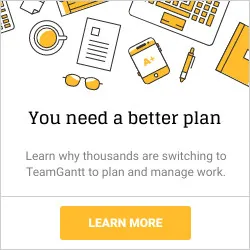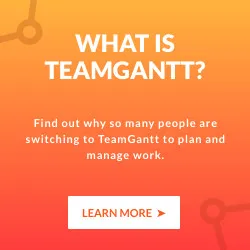How to Negotiate a Raise and Boost Your Pay Potential
.webp)
.webp)



The start of a new year is chock full of goals and resolutions—and maybe even the hope that this year will bring a big bump in pay. 💸
Whether you’re working up the courage to ask for a pay raise or prepping for your annual review, it helps to go into the negotiation with a few handy tips for success. So we asked a couple of industry leaders with teams of their own to give us the inside scoop.
While some insights speak directly to project managers, you’ll find plenty of practical takeaways you can apply to any job.
Meet our Q&A experts
Before we dig into the Q&A, let’s introduce you to the fine folks who shared their expert advice.

Sam Barnes, Engineering Manager, Marks and Spencer
Based in London, Sam Barnes helps run a department of software engineers who ship anything from pure back-end API and services to iOS retail apps and front-end starter kits. He also partners with senior management to continually improve how they deliver solutions to customers.

Justin Handler, Head of Accounts, O3 World
Justin Handler hails from Philadelphia and oversees O3 World’s project management team, as well as high-level strategy for projects and client accounts. He also supports new business by assisting with estimating, proposals, and scopes of work.
Now, onto the Q&A!
Expert Q&A: Negotiating a pay raise and improving your earning potential
What goes into a successful pay raise negotiation?
Sam Barnes
Ideally, you want to remove as many potential arguments your employer may challenge you with as possible.
My personal approach is to think of it like a business case or a sales proposal, though you won't necessarily deliver your proposal in this way. If you can state what you want and why you want it and provide solid evidence, an employer may still say no, but it makes it a lot harder for them to do so.
Justin Handler
Open, friendly, and honest communication. Compensation can be an uncomfortable thing to discuss, but it doesn’t have to be. Be thoughtful and reasonable, do your research, and understand your shortcomings. It’s important to consider, not only yourself, but also your coworkers and companies.
Usually if you've shown your value, these conversations shouldn’t be tenuous. Managers want to reward people for doing a great job.
What don’ts should you be careful to avoid?
Sam Barnes
Don't try to blackmail your employer into a raise. This common approach rarely seems to have positive long-term results.
At worst, your employer will simply say no, leaving you both with a bad taste in your mouth, and it's rare to come back from that. Even if your employer agrees, knowing you put them in a difficult position reflects poorly on your attitude and can manifest in poorer working relationships.
Pay raises are most rewarding when handled with sincerity on both sides, and work is best when both parties want to be there for the work and people. Money should be seen as a nice benefit. If people respect how you operate, in most cases, money comes and, along with it, respect.
Justin Handler
There are some great tools that can help provide insight into your market value. While I encourage the use of these research tools, be careful not to fall into the trap of taking these as gospel. I've seen many of them take data from very small companies all the way up to huge corporate enterprises.
I encourage people to look at multiple sources. The tools that allow you to add criteria for experience in years, company size, industry, perks/benefits, etc., give the most realistic view of market value from what I've seen. Don't be unrealistic about your pay raise expectation just because you heard what someone else is making.
For project managers, don't be afraid to bring data to the table. If you're bringing projects in on time and under budget and have happy clients, you can show that pretty easily.
How would you approach negotiation differently as part of an annual review vs. an ad hoc raise request?
Sam Barnes
One primary difference between the two is that, in a good company, an annual performance review will be partly based on preset objectives with metrics you agreed to with your manager.
Even if your company or manager doesn't put effort into creating good SMART goals, it’s in your own interest to do so. The more specific, measurable, attainable, relevant, and time-bound an objective is, the easier it will be to demonstrate your progress and help justify a pay increase.
On the other hand, if you create a fluffy set of objectives that can be interpreted differently by people, it doesn’t matter if you did well on them. If your manager disagrees, you'll have no hard evidence to dispute that opinion.
In an annual review, I'd want to remove as many reasons as possible that a manager could use to challenge my pay raise, as opposed to an ad hoc request where nothing has been agreed upon beforehand.
Justin Handler
For an annual performance review, where you're continuing to do your job and grow but may not be up for a promotion, I like to go in with proper expectations. Lots of data out there can provide good guidelines around what you should expect in a yearly review. Being well-informed about what’s reasonable vs. what’s not can help these conversations.
Ad hoc raise requests are different because they typically involve a promotion of some sort. I would approach an ad hoc raise request with tangible value I can show (whether it's new business, being under budget on projects, etc.), as well as new responsibilities or value I can bring to the organization. For a project manager, it's relatively easy to show value based on your project budgets, timelines, and client health.
Again, going into this with good expectations around timeline for the pay raise is important. You should also consider areas where you may have fallen short so you have areas to improve as well.
What steps can you take to improve your long-term earning potential?
Sam Barnes
Think like an employer. In the present, you can ensure you work hard and try to gain the respect of everyone around you. Aside from the many ethical and beneficial reasons to work this way, a practical reason is that people leave companies, and over time, your team now may spread out over many companies. These folks are essentially your future employers, either directly or via personal recommendations. If you can create and maintain a good reputation with colleagues, this can lead to better roles in the future.
You should also try to keep up-to-date with the latest trends in your space. Too many people get to certain levels of their career and slowly become complacent. This is a mistake, especially in technology spaces that move so fast!
Regardless of your role, I always advocate for creating a name for yourself in the space you work in. It's not as difficult as people think and just requires time and discipline. At the extreme end, this means frequently writing articles and speaking at conferences—but that’s not for everyone.
However, if you’re looking for long-term job security, create an online home for your current CV, articles you’ve written, and links to social media accounts where you post useful curated content, and get involved in communities within your space. When you have two candidates in the mix for a role, employers will most likely gravitate towards the person who clearly has a passion for their job, space, and communities.
Justin Handler
For project managers, I always try and look at value-adds to an organization. After you've grasped project management, the natural next step is to develop skills around account/client management and strategy.
Being a project manager uniquely puts you on the front lines and in a position to offer value to your clients and bring in new business. You're typically involved in a lot of really strategic and important business discussions. If you're able to deal with people, develop strategy, and create opportunities for your company, your long-term pay potential in the project management track is high.
The biggest thing I like to tell people is that this is a long game. A lot of digital project managers are on the younger side at digital agencies, so gaining these skills over time and mastering them will help your long-term potential. Trying to get everything overnight may actually stunt your potential.
Make it easy to prove your project management worth
Want to impress your leaders? Take advantage of every opportunity to learn and grow. And don’t forget to equip yourself with a tool that makes it easy to score project wins and share your success with others.
With TeamGantt, you’ll have all the features you need to ensure projects finish on time and under budget, including:
- Drag and drop simplicity
- Easy team collaboration
- Customizable views
- Team availability & workload management
- Planned timeline vs. actual timeline
- Project health reports
- Dedicated mobile app